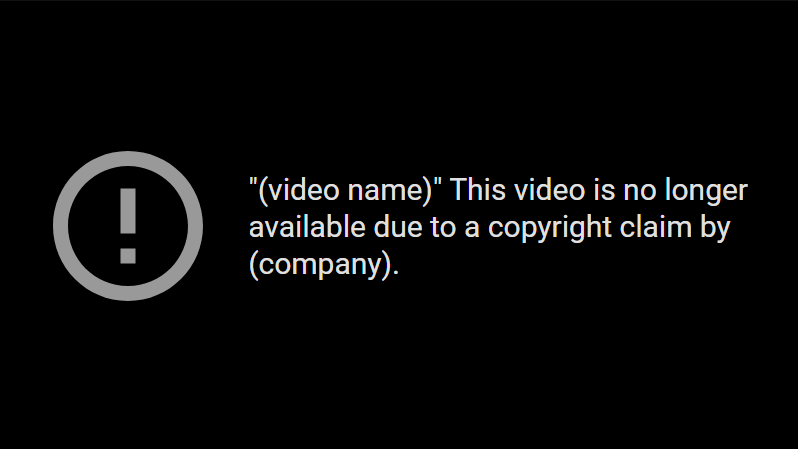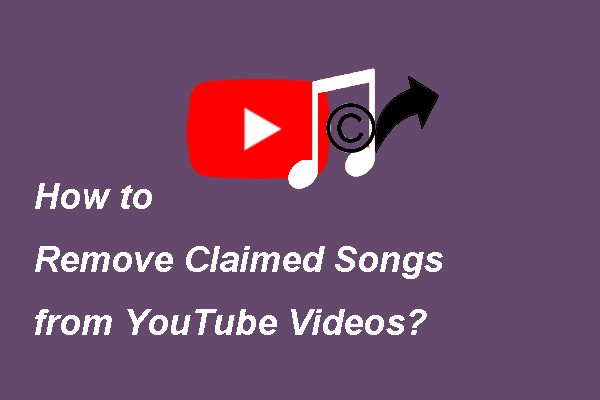Have you ever received a YouTube takedown request? If you don’t know much about it, you really need to read this post offered by MiniTool. It will show you what the takedown request is, how to determine if the request is legitimate, what to do if the material is not an infringement and what to do if your content is still up.
What Is the Takedown Request?
The takedown request are sometimes referred to as a Digital Millenium Copyright Act takedown notice.
This notice is provided to a search engine, infringing party, internet service provider, web host or company who is hosting or linking to copyrighted material. These copyrighted materials include videos, written words, artwork, photos, etc.
Who can issue YouTube takedown request? These requests can be sent without the supervision of an attorney, which means that anyone can send a request to a company claiming copyright infringement.

The threat of taking legal action or losing the accounts altogether can be very frightening for anyone who does not have a full understanding of copyright law. Therefore, people may abuse this power.
As the DMCA notes, typically, infringing parties or Internet service providers receive such requests and might take down the content.
Whether the Request Is Legitimate?
If you are clearly infringing someone else’s copyright by, for example, publishing a picture without the permission of the photographer, you may get a copyright takedown notice. You can delete photos or risk further legal action. Needless to say, deleting photos is easier than hiring an attorney.
However, YouTube may take down videos without your consent in response to your request. But there are plenty of exceptions, circumstances and grey areas. In any case, you should first ask yourself: is the material copyrighted?
For example, if your content is in the public domain, there is no problem to publish it. The public domain represents all that is owned by the public, not all that is owned by individuals. Not if the copyright expires.
“Happy Birthday to You”, a well-known song, entered the public domain only recently after its publisher failed to obtain and maintain valid copyright on the lyrics.
If your content belongs to fair use, there is no need to take down it. One of the most common examples of fair use is the imitation of another work. A critique or criticism of a work is another example. For example, quoting a line from a song in a review. Converting an image so that it is not sufficiently like its original might be considered another example.
If you are not sure if your content is fair use, public domain or other permissible use, you can choose to contact an attorney for a little help.
What to Do If the Material Is Not an Infringement?
Typically, after a DMCA notification, the content in question will either be deleted by the web host or a warning will be issued. If your content is taken down, you can try to send a letter back, just as in a DMCA’s counter-notice.
On most platforms, it’s actually easy to submit a counter-notice request. On YouTube, the process is automated. You just need to follow the instructions to fill out the appropriate form on their website.
Does the counter-notice retain content on your site? Perhaps. On YouTube, the claimants or individuals claiming infringement have 10 days to provide the platform with evidence of court action, or the content will be recovered.
But like the actual take-down notice, counter-notices can also be easily misused. For example, a user claimed that a video violated his copyright, but the user fought back with a successful counter-notice and eventually restored the video’s copyright.
That’s the thing. If you don’t sue the person, the video keeps getting reposted. A lot of youtubers have been dealing with this issue.
What If Your Content Is Still up?
If your content has not been removed, you can contact YouTube or the sender. You shouldn’t ignore this letter. Instead, you should prove that you have the right to use the content. Perhaps you can provide the appropriate license from the stock agent that provided the photo in question.
If you are asked to pay, don’t give up now. Be sure to thoroughly know the issuer of the notice to avoid being duped. Search online to see if others have received similar threats from the same issuer. If that’s the case, maybe you should consider hiring a lawyer. It’ll be worth it.
Further reading: The Top 8 Common YouTube Errors – How to Fix Them.
Bottom Line
After reading this post, you should get more information of the YouTube takedown request. If you receive one right now, you should be able to know what to do. Hope this article is helpful to you.


